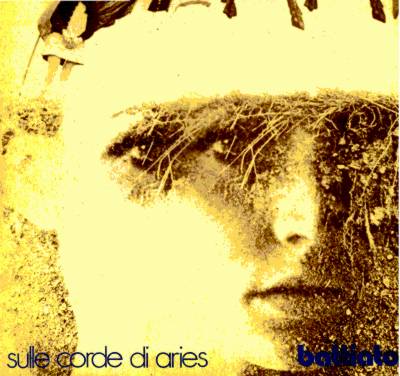 He began his career as a "light" singer, recording a few singles. In 1971 he started his particular journey through experimental music, recording his proggiest issues: "Fetus", "Pollution", "Sulle corde di Aries". Some very atmospheric parts and some very melodic songs make these records worthwhile, along with musical references to the arabic culture and italian folk that will surface from time to time in all of his following output. His next records are gradually more and more experimental, exploring minimalism and culminating with "L' Egitto prime delle Sabbie", with two long pieces based on hardly one note and its harmonics. Very difficult, I can´t recommend this period to anyone but music scholars or any Stockhausen students. After this, came a great change of direction.
He began his career as a "light" singer, recording a few singles. In 1971 he started his particular journey through experimental music, recording his proggiest issues: "Fetus", "Pollution", "Sulle corde di Aries". Some very atmospheric parts and some very melodic songs make these records worthwhile, along with musical references to the arabic culture and italian folk that will surface from time to time in all of his following output. His next records are gradually more and more experimental, exploring minimalism and culminating with "L' Egitto prime delle Sabbie", with two long pieces based on hardly one note and its harmonics. Very difficult, I can´t recommend this period to anyone but music scholars or any Stockhausen students. After this, came a great change of direction.From "L'era del Cinghiale Bianco" to "Mondi Lontanissimi", these are pop-rock records, but very interesting (and even commercially successful) ones. Especially the lyrics, sometimes very deep, sometimes ironic, full of references. He starts singing in many different languages, even within one song.
With "Fisiognomica", Battiato started walking towards classical music, using orchestra on some songs and composing a couple of operas. "L'Imboscata" and "Gommalacca" are rockier than any of his previous works. The latest has a shy return to prog and experimental, yet for a wide audience. Album:
 Battiato's third release and showed his fascination for electronic, minimalist and systemic musics. As such, it is quite similar to "Pollution" except much more electronic based and with a more definitive style. There are also a lot of modern classical strains coming through here and a great spacey feel again reminding me of Sensations Fix or Gong at times. A simply fascinating album.
Battiato's third release and showed his fascination for electronic, minimalist and systemic musics. As such, it is quite similar to "Pollution" except much more electronic based and with a more definitive style. There are also a lot of modern classical strains coming through here and a great spacey feel again reminding me of Sensations Fix or Gong at times. A simply fascinating album.
Battiato
ReplyDelete